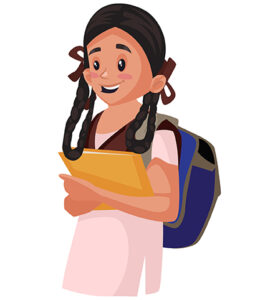Introduction
The author of “Bholi” is Khwaja Ahmad Abbas. Sulekha, or Bholi as she is better called, is the protagonist of this tale. Because of her unattractiveness and lack of skill, she was looked down upon by everyone. She turned down her marriage proposal from a stingy elderly guy on her wedding day after she’d reached adulthood.
Summary of the chapter
The narrative’s protagonist is a young lady named Sulekha. She was known as Bholi because of her plainness. She suffered from a stutter due to the brain damage she had throughout her early years of learning to speak. She caught smallpox as a kid, permanently disfiguring her face with pockmarks. As a result, she endured ridicule for her ugliness and lack of intelligence.

Indian girl
Tehsildar instructed Ramlal to sign up his daughters for school on the first day of classes. At first, Bholi was terrified by the thought of attending school. After she obtained the attention, clothing, and other necessities she needed, however, she began to see school as preferable to her home. As the instructor called her name, she stutteringly answered, much to the amusement of her other students. She grew disheartened and started crying as a result. Only after her instructor asked her to repeat the name with a cheerful expression did Bholi finally learn how to pronounce it correctly. The educator offered her encouragement to keep returning to school despite her stammering. That gave Bholi a reason to believe in a better future.
Bholi was proposed to by Bishamber Nath, an elderly crippled man whose own children were now adults when she reached adulthood. A female attendant lifted the veil off her face when the groom was getting ready to approach the bride. Bisambar was put off by Bholi’s unattractive appearance and hence was unwilling to marry her without a dowry. Her dad set up the dowry funds. But, Bholi turned down Bishamber’s marriage proposal because of his avarice. She shocked everyone by not stuttering when she spoke. Bishamber left the event and returned home. Bholi promised her father that she would one day teach at the school from which she had benefited greatly and also look after his ageing parents.
About the author
Besides being an Indian film screenwriter, director, journalist, and novelist, Khwaja Ahmad Abbas was a writer in Hindi, English, and Urdu as well. The Indian film industry honoured him with four ‘National Film Awards’.
Conclusion
This story teaches us that during the crucial years of childhood when children are still developing into responsible adults. We need to provide them with moral and emotional support. It discusses the harmful social practices that are still common in certain regions of the world and how young girls are made vulnerable to these practises due to a lack of knowledge in the community as a whole.
Textbook Question and Answers
1. Bholi had many apprehensions about going to school. What made her feel she was going to a better place than her home?
Ans. Once she had received proper care, good clothes, and other things, she started believing that school was a better place than her home.
2. How did Bholi’s teacher play an important role in changing her life?
Ans. The school teacher motivated her to talk with confidence. In addition to being polite, she played a key role in enhancing her confidence level and making her a more capable reader, writer, and speaker.
3. Why did Bholi at first agree to an unequal match? Why did she later reject the marriage? What does this tell us about her?
Ans. Bholi agreed to an unequal match because her parents were concerned about her marriage, and the groom was not asking for any dowry. Later she rejected the marriage because the groom asked for a dowry after seeing her ugly face. This indicates that Bholi was full of confidence and self-respect, because of which she could handle the worst situation wisely by taking a brave decision.
4. Bholi’s real name is Sulekha. We are told this right at the beginning. But only in the last but one paragraph of the story is Bholi called Sulekha again. Why do you think she is called Sulekha at that point in the story?
Ans. In the entire story, the girl’s name is mentioned as Bholi, which means a simple girl who does not express her point of view in any situation. When she got an education, she gained the confidence to speak and stand for her rights. When she refused to marry the old man in front of everyone she proved that she was not a Bholi anymore. So the author called her Sulekha.
5. Bholi’s teacher helped her overcome social barriers by encouraging and motivating her. How do you think you can contribute towards changing the social attitudes illustrated in this story?
Ans. We can contribute towards changing the social attitudes illustrated in the story by educating boys and girls regarding their rights, providing equal education opportunities, and opposing dowry.
6. Should girls be aware of their rights and assert them? Should girls and boys have the same rights, duties and privileges? What are some of how society treats them differently? When we speak of ‘human rights’, do we differentiate between girls’ and boys’ rights?
Ans. There is no doubt that girls should be aware of and assert their rights. The rights, privileges, and duties of girls and boys must be equal. In villages and small towns, people treat boys and girls differently. Girls are usually trained to be polite, calm, and expert at household chores with their parents, whereas boys are more likely to be educated. The law does not distinguish between girls’ and boys’ rights when we speak of ‘human rights’, but society does.
7. Do you think the characters in the story were speaking to each other in English? If not, in which language were they speaking? (You can get clues from the names of the persons and the non-English words used in the story.)
Ans. The characters in the story were not speaking to each other in English. It is evident from the text that characters spoke in Hindi, using terms like the number dar, pita ji, tehsildar, and izzat.
Bholi Class 10 Extra Questions and Answers
1. Discuss children’s rights.
Ans. Children have the same rights as adults, including health care, an appropriate education, the means of subsistence, safety, and participation in decision-making, among other things.
2. Can speech problems take place due to brain problems?
Ans. Damage to the part of the brain which controls the “speech movement” can result in stammering while speaking. People who get traumatic brain injuries have a chance of stammering.
3. What is the moral of the story?
Ans. We can learn from this story that children should be morally and emotionally protected during their formative years to grow up to be good citizens.
 Mission Statement
Mission Statement
“Empower every student to achieve full potential”
88Guru has been established with the social objective of making quality video-based learning material available to all Indian students. Technology, Connectivity and Social Media are rapidly changing the world of Education and we wish to lead the transformation of the tuition industry in India.
88Guru is the perfect complement to the current tuition model. 88Guru creates a wonderful opportunity for children and parents to bond while engaging in a valuable learning activity. It also provides the complete curriculum at your fingertips for those moments when you need some help at short notice. We believe that this mode of tuition could be transformational, adding hours to a child's day while providing complete control over the learning process.
Every course is taught by the best teachers from India's top schools and conducted in an engaging manner to keep students involved. The e-learning process consists of video-based instructions, computer-graded assignments, and a dashboard which allows the student and parent to track progress.


